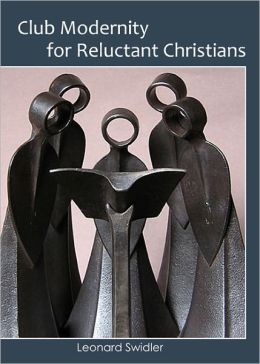Leonard Swidler’s Club Modernity for Reluctant Christians, reviewed by John R. Miller
 Leonard Swidler, Club Modernity for Reluctant Christians (Philadelphia, PA: Ecumenical Press, 2011), 216 pages, ISBN 9780931214127.
Leonard Swidler, Club Modernity for Reluctant Christians (Philadelphia, PA: Ecumenical Press, 2011), 216 pages, ISBN 9780931214127.
Leonard Swidler, Professor of Catholic Thought and Interreligious Dialogue at Temple University, explores the challenges of faith and modernity. He has divided this book into four main sections, fluidly integrating its 36 chapters into a progressive and logical structure. He draws from modernity’s biblical scholars in order to defend his premise, which offers a way to amalgamate critical-thinking with an “inner encounter with the Transcendent.” Club Modernity adds Swidler’s voice to the conversations of Sartre, Borg, et.al.
Two curious things struck me as I began to read this book. The first is the physical format of the book and its binding. The format of its pages included minimal margins on both sides of the page, forcing the reader to nearly break the binding of the book’s spine to read the words located close to the book’s center. Likewise, there was no index or bibliographical citation at the close of the book, which for an academic book seemed odd. The second curiosity was the repeated inclusion of citations from Wikipedia. Normally, the academic world shuns Wikipedia and warns students to avoid it as an unreliable resource. Thus, for an academic like Swidler to use it several times seemed out of place. Additionally, the book seemed rushed to print, leaving multiple format, punctuation, and citation errors evident and unedited.
Swidler makes one minor presumption and two major assumptions in his attempt to defend his position. The minor presumption is seen in the academic language used, which borders on academic arrogance; one often wonders what audience the book is attempting to impress. The first major assumption noticed is how Swidler quickly makes claims and/or repeats the foundational claims of modernity’s liberal scholars, then goes on to build on their theories as being universally accepted. This is not the case for all biblical scholars, but Swidler has built a straw man that is ready to be defeated. The second is how he adds his own contributions to literary and biblical criticism, which champion the authorship of the gospel of Luke as being a woman (Luka), who wrote a “proto-Luke” as-well-as the authorship of the gospel of John as being written by Mary Magdalene, who was cryptically called the “beloved disciple” and referenced throughout the gospel.
Ironically, Club Modernity attempts to chart a middle way between postmodern critiques of the truth claims of the Bible and the proof claims of modernity. Swidler endeavors to satisfy the rigid demands of rationality over and against the mysticism of spirituality. Unfortunately, the book does not convincingly accomplish its goals. Undoubtedly, the book will find support in the circles of liberal scholarship and will dismissed as folly by the circles of conservative scholarship.
Reviewed by John R. Miller.
Category: In Depth


